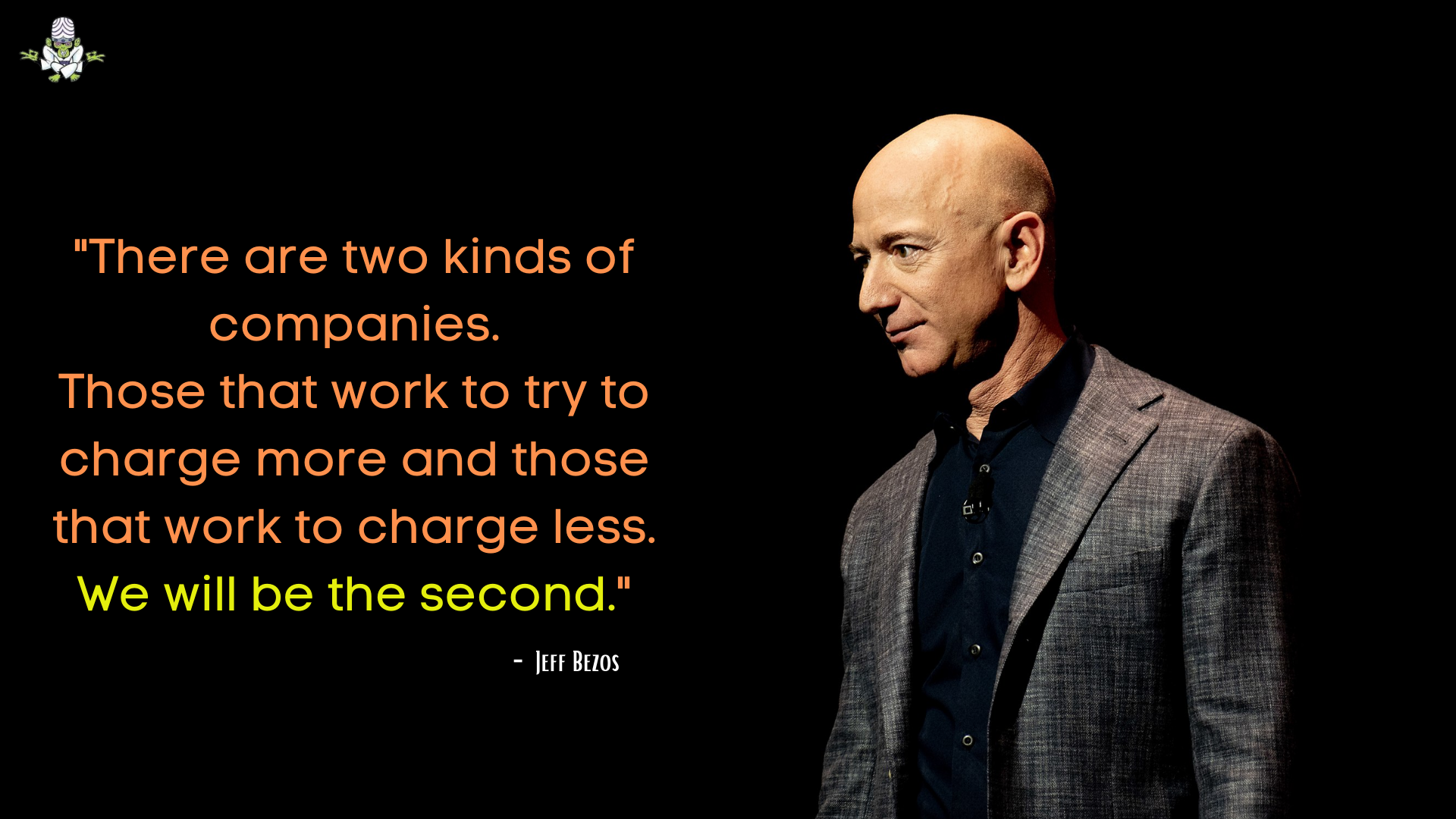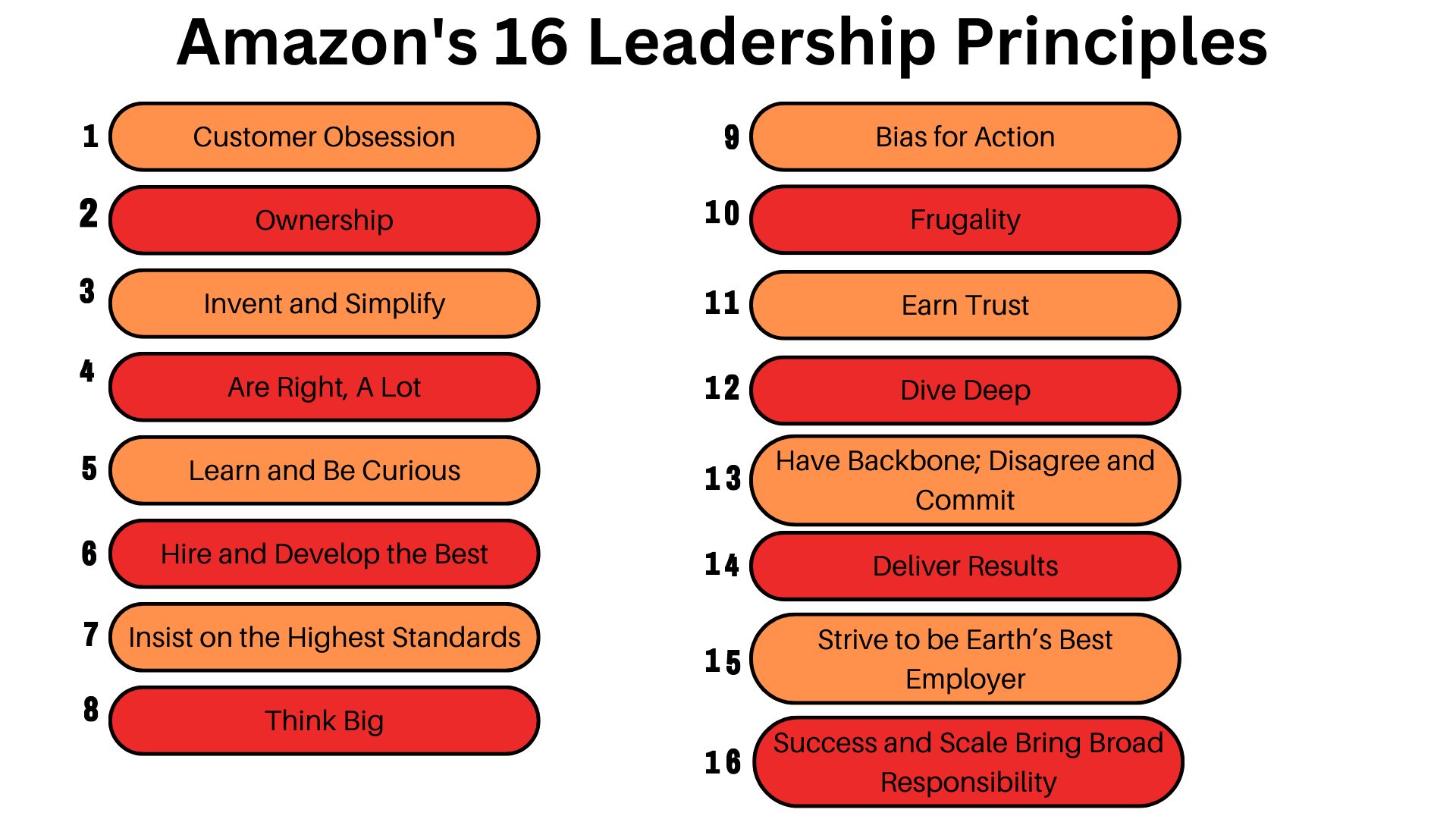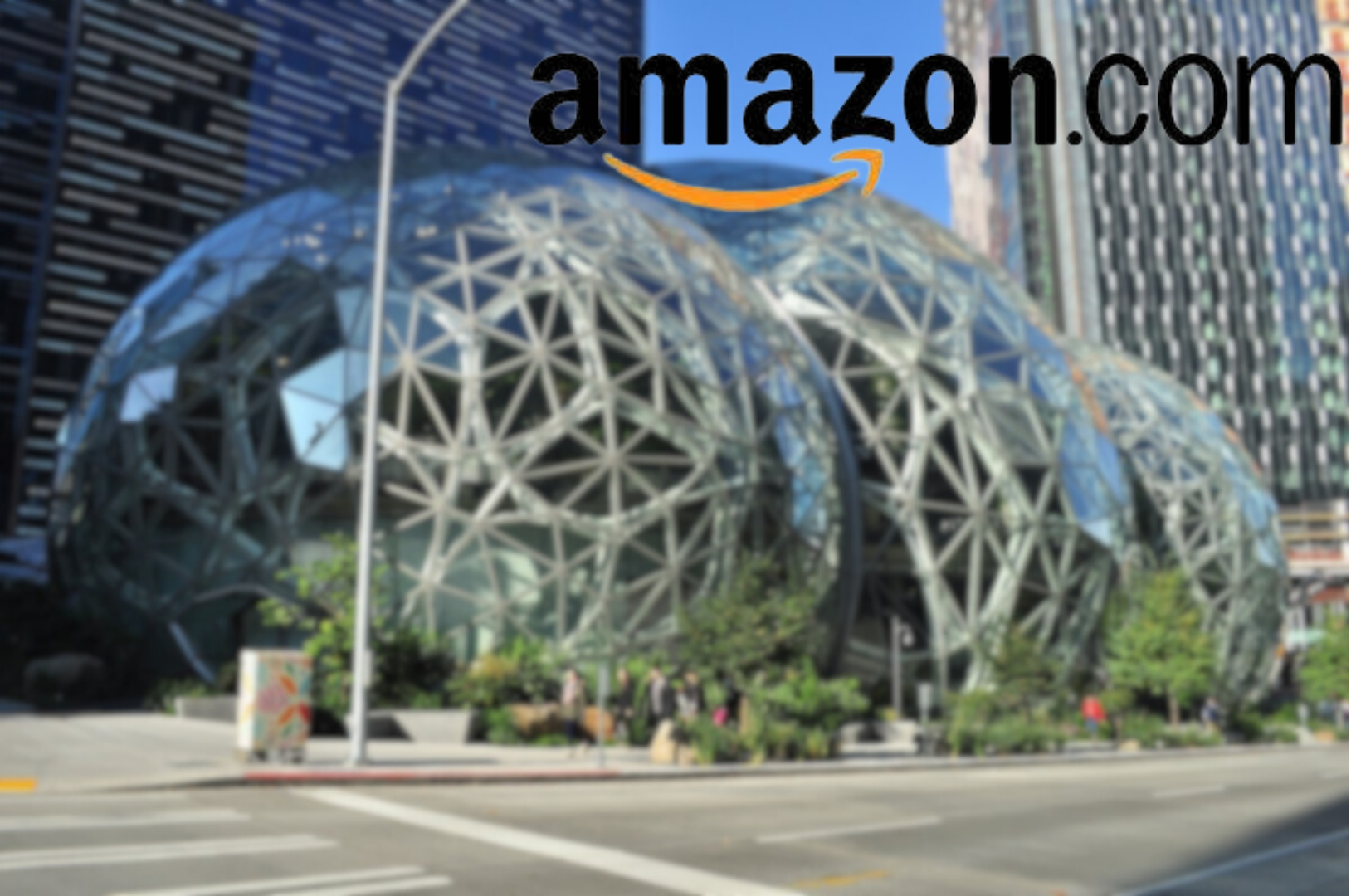Introduction
Amazon, founded in 1994 by Jeff Bezos, began as an online marketplace primarily focused on selling books. However, the company's vision and ambition soon led it to
expand its horizons and diversify its offerings. Today, Amazon is not only the largest online retailer in the world but also a technology giant that has
revolutionized various industries.
At its core, Amazon is driven by a mission to be the most customer-centric company on the planet. This customer obsession has been the driving force behind the
company's success. From the very beginning, Amazon set out to provide a seamless and convenient shopping experience for its customers. By leveraging the emerging
power of the internet, Amazon offered an extensive selection of books and ensured efficient delivery to customers' doorsteps.
As Amazon continued to grow, it recognized the potential to extend its reach beyond books. The company diversified its product offerings to include electronics,
clothing, home goods, and much more. Today, virtually any product one can imagine is available on Amazon's platform.
In addition to its e-commerce dominance, Amazon made strategic forays into other sectors. One of its most notable ventures is Amazon Web Services (AWS), a
comprehensive cloud computing platform. AWS provides businesses with scalable and cost-effective cloud solutions, revolutionizing the way organizations manage
their IT infrastructure. With a vast array of services, including storage, computing power, and data analytics, AWS has become a cornerstone of many businesses
worldwide.
Amazon's influence also extends to the entertainment industry. Through Amazon Prime Video, the company delivers a wide range of movies, TV shows, and original
content directly to consumers. Amazon Prime, a subscription service offering various benefits such as fast shipping and exclusive deals, has garnered millions
of subscribers globally.
Now, Amazon has a market capitalization of nearly $1 trillion, making it one of the most valuable companies in the world by this metric. Amazon's meteoric ascent is
at least partially attributable to the Amazon Leadership Principles, which have become central to the company's culture.
Amazon, which was considered a potential dot-com failure in 2000, has endured and overcome two market collapses. Jeff Bezos, the eccentric and well-known founder
of the company, believes that a solid corporate culture is essential to its success. Bezos and an early leadership team formulated the Amazon 14 Leadership
Principles as a result. In 2021, 27 years after the company's inception, Amazon added two more Leadership Principles, bringing the total to sixteen. These Amazon
leadership principles impact team dynamics and interview queries.
In this article, we will examine each of Amazon's 16 Leadership Principles, explain what they entail, and then provide examples of how they may manifest themselves
during an interview. By giving careful consideration to the Amazon Leadership Principles and demonstrating how they have manifested in your professional history,
you will demonstrate to the interviewer that you have the leadership skills necessary to be a team member.
Amazon Leadership Principles: A Guide to Success in the World's Most Customer-Obsessed Company

Taking a moment to reflect, as a proprietor develops a company, defining the company's principles is one of the most crucial decisions. This
decision is crucial because it will shape the company's focus areas and provide employees with a "guidebook" on how to create the product, make decisions, and treat
customers, among other things. In his first shareholder letter in 1997, Jeff Bezos stated that Amazon's mission was "to be the most customer-centric company on
Earth." Since then, Amazon's leadership principles have been refined over the course of more than two decades.
Ultimately, Amazon views its leadership principles as "an integral part of Amazon's culture"; as the graphic below demonstrates, the principles constitute the
company's DNA. According to Amazon, "Amazon's Leadership Principles are great tools that help us foster autonomous decision making as the company grows and help
leaders lead beyond their immediate field of vision."
During the interview process, Amazon evaluates candidates based on their adherence to the company's values. To succeed in the interview, you
must first comprehend what it means to adhere to the principles. Then, it is crucial to determine if you wish to perform for a company with these values. For
instance, the principles "insist on the highest standards," "bias for action," and "dive deep" demonstrate that Amazon is one of the most innovative and successful
companies in the world.
Alternatively, these principles may suggest that Amazon has a poorer work-life equilibrium than other companies. In addition, the principle of "have backbone;
disagree and commit" is ideal for candidates who enjoy expressing their opinion and being occasionally contrary, but may be challenging for candidates who prefer
to always seek consensus.
The organizational culture is defined and shaped by a set of values called the Leadership Principles. Midway through 2021, Amazon announced
the addition of two more Leadership Principles, making the renowned list of 14 Leadership Principles a total of 16.
Amazonians make decisions at all levels daily using the guidelines on this list. The importance of becoming familiar with these concepts, comprehending their actual
significance, and being able to share personal examples that show this understanding throughout the interview process cannot be emphasized enough.
To put it another way, you must be able to explain each principle philosophically and give concrete examples from your past that illustrate it.
The majority of your preparation will probably be spent on getting ready for this. For each concept, you should be prepared with one example. Successful
interviewees often put in between 10 and 15 hours of preparation and at least four hours of mock interviews.
Significance of 16 Amazon Leadership Principles
At the core of Amazon's remarkable success story are its 16 Leadership Principles. These principles serve as the foundation upon which the company operates and
are deeply ingrained in its corporate culture. They guide decision-making, shape behavior, and foster an environment of innovation, accountability, and
customer-centricity. In this article, we will delve into the significance of Amazon's Leadership Principles and explore how they contribute to the company's
ongoing dominance in the business world.
The following is an overview of the 16 Amazon Leadership Principles, along with some examples and practice interview questions to assist you get a better
grasp on each one:

 Learn More️
Learn More️
1. Customer Obsession: A Customer-Centric Approach
Leaders start with the customer and work backwards. They work vigorously to earn and keep customer trust. Although leaders pay attention to competitors,
they obsess over customers.

Prioritizing the Customer Experience
Amazon's first leadership principle, "Customer Obsession," emphasizes the company's steadfast dedication to prioritize its customers' wants and wishes above
everything else. This notion is the foundation of Amazon's success since it recognizes that a firm cannot thrive without satisfied consumers. Amazon has become
a global leader in e-commerce by stressing the consumer experience, setting new benchmarks for excellence and customer-centricity.
Anticipating and Exceeding Customer Expectations
Amazon goes beyond simply satisfying consumer expectations to represent customer passion. The organization continually works to anticipate and surpass such
expectations. Amazon keeps in tune with changing customer requirements and preferences by employing data-driven insights, performing extensive market research, and
investing in customer feedback platforms. This proactive approach helps the organization to evolve and adjust its services, ensuring that excellent customer
experiences are consistently delivered.
Example: Customer Service and Support
Amazon's dedication to consumer obsession is seen in its customer service and assistance. The company goes to great measures to support its customers in a quick
and effective manner, addressing any issues or concerns they may have. Amazon has a variety of support methods, including live chat, email, and phone support,
allowing customers to reach out and get help quickly. Furthermore, the organization places a premium on transparency and works hard to answer client enquiries and
complaints in a fair and satisfactory manner. Amazon creates trust and strengthens customer connections by providing great customer service.
Interview Question Related to Customer Obsession
• In your experience, what makes some customers especially difficult to manage while others are easier?
• How do you prioritize customer needs when you’re dealing with a large number of customers?
• Share an example where you use customer feedback to drive an improvement in your previous business.
• What is the difference between customer focus and customer obsession?
2. Ownership: Taking Initiative and Being Accountable
Leaders are owners. They think long term and do not sacrifice long-term value for short-term results. They act on behalf of the entire company,
beyond just their own team. They never say “that’s not my job.”

Taking Responsibility for Outcomes
At Amazon, "ownership" is a basic leadership principle that emphasizes the significance of accepting responsibility for outcomes. Employees at Amazon are empowered
to act as owners, making decisions and performing actions that produce outcomes. This idea instills a sense of accountability and ownership, allowing individuals to
have a direct impact on the organization's performance.
Thinking Long-Term and Acting Decisively
Amazon values long-term thought and decisive action in addition to taking responsibility. The organization pushes its leaders to think about the future and make
daring decisions that match with the company's vision and strategy. This approach enables Amazon to remain competitive, drive innovation, and navigate the
continually changing business landscape.
Example: Amazon Web Services (AWS)
An excellent example that exemplifies the principle of ownership at Amazon is the creation and growth of Amazon Web Services (AWS). AWS, Amazon's cloud computing
platform, was launched in 2006. At that time, cloud computing was a relatively new concept, and many companies were hesitant to embrace it.
Through ownership and long-term thinking, Amazon developed AWS into a global leader in cloud computing. Today, AWS provides a wide range of services and solutions,
serving millions of customers worldwide. By taking ownership of this innovative venture and thinking long-term, Amazon not only transformed the company but also
revolutionized the entire technology industry.
Interview Question Related to Ownership
• How do you balance focusing on your day to day tasks without losing track of the long term vision?
• Tell me about a time when you took on a task that went beyond your normal responsibilities.
• When did you go outside of the boundaries of your defined role to fix a problem?
3. Invent and Simplify: Embracing Innovation and Efficiency
Leaders expect and require innovation and invention from their teams and always find ways to simplify. They are externally aware, look for new ideas from
everywhere, and are not limited by “not invented here.” As we do new things, we accept that we may be misunderstood for long periods of time.

Encouraging Innovation and Problem-Solving
Amazon's success is built on the "Invent and Simplify" approach, which stresses the company's commitment to innovation and problem-solving. Employees at Amazon
are encouraged to think creatively, to question conventional thinking, and to suggest innovative ideas that have the potential to transform processes, products, or
services. This idea emphasizes that staying ahead in a continuously changing world and driving genuine development requires innovation.
Simplifying Complex Processes and Solutions
Amazon prioritizes simplification in addition to encouraging innovation. Complex processes and solutions can add additional complications, limit progress, and
impair efficiency. Amazon hopes to enhance speed, productivity, and the overall customer experience by streamlining operations. This principle recognizes that in
today's fast-paced business world, simplicity is critical to attaining optimal results and keeping a competitive edge.
Example: Amazon Prime
An excellent example that demonstrates the "Invent and Simplify" principle at Amazon is the creation of Amazon Prime. Recognizing the need to simplify and
enhance the online shopping experience for customers, Amazon introduced the concept of Prime membership. Amazon Prime offers a wide range of benefits, including
fast and free shipping, access to streaming services, exclusive deals, and more.
Moreover, Amazon continued to innovate and expand the Prime offering over time. They introduced additional benefits such as Prime Video, Prime Music, and Prime
Reading, further enriching the membership and providing a holistic entertainment experience. This continuous innovation and simplification of the customer
experience have contributed to the success and widespread adoption of Amazon Prime.
Interview Question Related to Invent and Simplify
• What is the most innovative or inventive thing you’ve achieved (process improvement, product idea)?
• Tell me about a time where you found a simple solution to a complex problem.
• Give me an example of a time that you were faced with a complex problem, but the solution you designed could be described as simple.
• Tell me about a time when you changed a process at work through either an innovative new way or simplification.
4. Are Right, A Lot: Making High-Quality Decisions
Leaders are right a lot. They have strong judgment and good instincts. They seek diverse perspectives and work to disconfirm their beliefs.

Emphasizing Data-Driven Decision-Making
The "Are Right, A Lot" philosophy at Amazon demonstrates the company's dedication to making decisions based on facts. Amazon is aware of how data and analytics
may reduce individual biases and maximize favorable outcomes. Utilizing data, Amazon makes certain that decisions are supported by facts and analysis, resulting in
wise decisions and better outcomes. In a culture where choices are continuously assessed and improved, this idea also promotes ongoing learning and improvement.
Seeking Diverse Perspectives and Opinions
Although data is a crucial part of decision-making, Amazon understands the value of various viewpoints and ideas. The business promotes an inclusive workplace
where workers are free to share their opinions and refute conventional wisdom. Amazon benefits from its workforce's collective intellect through embracing diversity,
which boosts innovation, creativity, and problem-solving skills.
Example: Product Development and Customer Insights
A notable example that showcases the "Are Right, A Lot" principle is Amazon's approach to product development and customer insights. When developing new products
or features, Amazon relies heavily on data and analytics to guide decision-making.
Amazon recognizes the importance of diverse perspectives in understanding customer behavior and preferences. The company encourages employees from different
backgrounds and experiences to contribute their insights and opinions. By seeking diverse perspectives, Amazon gains a broader understanding of its customer base,
which allows for more comprehensive analysis and decision-making.
Interview Question Related to Are Right, A Lot
• When was the last time you made an incorrect decision?
• Tell me about a time when you followed your intuition and made a decision.
• What tangible impact did your achievement have?
5. Learn and Be Curious: Cultivating a Growth Mindset
Leaders are never done learning and always seek to improve themselves. They are curious about new possibilities and act to explore them.

Cultivating a Culture of Continuous Learning
The "Learn and Be Curious" principle highlights Amazon's commitment to promoting a culture of lifelong learning. For both individual development and business
success, Amazon understands the value of knowledge and skills. Amazon fosters a culture where people are inspired to learn more, explore novel concepts, and hone
new abilities through promoting employees' love of learning. This idea fosters a thirst for learning throughout the organization and fosters an attitude of
intellectual curiosity.
Encouraging Intellectual Curiosity and Exploration
Amazon not only encourages lifelong learning but also promotes intellectual curiosity and investigation. The organization encourages employees to explore
uncharted territory, pose inquiries, and refute preconceived notions. Amazon supports intellectual curiosity in the workplace, which fosters creativity and helps
people find new opportunities.
Example: Amazon Robotics and Innovation
A compelling example that exemplifies the "Learn and Be Curious" principle is Amazon's exploration of robotics and automation technologies. Recognizing the
potential for these technologies to revolutionize the e-commerce industry, Amazon invested in research and development in the field of robotics.
By encouraging employees to learn about robotics and be curious about its applications, Amazon was able to establish Amazon Robotics. This division focuses on
developing cutting-edge robotic systems and automation solutions to enhance efficiency and productivity within Amazon's fulfillment centers.
Interview Question Related to Learn and Be Curious
• Tell me about a time when your ability to ask probing questions is what helped a group or individual reach a solution?
• How do you find the time to stay inspired, acquire new knowledge, and innovate in your work?
• Tell me about a time when you made a better decision with the help of your curiosity.
6. Hire and Develop the Best: Building a Talented Team
Leaders raise the performance bar with every hire and promotion. They recognize exceptional talent and willingly move them throughout the organisation.
Leaders develop leaders and take seriously their role in coaching others. We work on behalf of our people to invent mechanisms for development like Career
Choice.

Attracting Top Talent
The "Hire and Develop the Best" principle at Amazon highlights the company's commitment to attracting and retaining exceptional talent. Amazon recognizes that
the success of the organization hinges on the collective capabilities and expertise of its workforce. Therefore, the company places great importance on attracting
the best candidates who possess the skills, knowledge, and cultural fit necessary to contribute to the company's growth and success.
By assembling high-performing teams composed of top talent, Amazon establishes a strong foundation for excellence, innovation, and problem-solving throughout
the organization.
Investing in Employee Growth and Development
Once top talent is onboarded, Amazon continues to invest in their growth and development. The company understands that nurturing and supporting employees'
professional growth not only benefits the individual but also contributes to the overall success of the organization.
Amazon provides various resources and opportunities for employee growth and development. These include:
1. Training and Learning Programs: Amazon offers comprehensive training programs to enhance employees' skills and knowledge in their respective fields. These programs
encompass technical training, leadership development, and other professional development opportunities.
2. Career Advancement: Amazon fosters a culture that promotes internal mobility and advancement. Employees are encouraged to explore new roles and take on new
challenges within the organization, providing opportunities for personal growth and career progression.
3. Mentorship and Coaching: Amazon recognizes the value of mentorship and coaching in fostering employee development. The company pairs employees with experienced
mentors who provide guidance, support, and feedback to help them excel in their roles.
4. Performance Evaluation and Feedback: Amazon emphasizes regular performance evaluations and feedback sessions to help employees understand their strengths, areas
for improvement, and potential growth opportunities. This feedback-driven approach ensures continuous improvement and helps employees reach their full potential.
Example: Amazon Leadership Development Programs
A notable example that exemplifies Amazon's commitment to employee growth and development is its Leadership Development Programs. These programs aim to identify,
nurture, and develop future leaders within the organization.
By investing in programs like OLDP, Amazon demonstrates its dedication to developing its talent pool and equipping employees with the tools and opportunities they need to thrive.
Interview Question Related to Hire and Develop the Best
• What was your biggest hiring mistake? What did you learn from it? How do you earn trust from new employees?
• Tell me about a time you provided feedback to develop and leverage the strengths of someone on your team.
• What qualities do you look for most when hiring others?
7. Insist on the Highest Standards: Striving for Excellence
Leaders have relentlessly high standards—many people may think these standards are unreasonably high. Leaders are continually raising the bar and driving
their teams to deliver high-quality products, services, and processes. Leaders ensure that defects do not get sent down the line and that problems are fixed so
they stay fixed.

Pursuing Excellence in All Endeavors
The "Insist on the Highest Standards" principle at Amazon encapsulates the company's unwavering commitment to pursuing excellence in every aspect of its
operations. Amazon understands that maintaining the highest standards is crucial for delivering exceptional products, services, and experiences to its customers.
This principle serves as a constant reminder that mediocrity is not acceptable and that every endeavor should strive for excellence.
By pursuing excellence, Amazon sets itself apart from competitors and solidifies its position as a leader in the industry. The company continuously seeks ways to
improve and innovate, raising the bar for itself and inspiring others to do the same. Whether it is in product design, customer service, or operational efficiency,
Amazon strives to exceed expectations and consistently deliver the highest quality outcomes.
Setting High Expectations and Holding Oneself Accountable
In addition to pursuing excellence, Amazon places great emphasis on setting high expectations and holding oneself accountable. The company recognizes that
setting the bar high is essential for driving continuous improvement and achieving ambitious goals. Amazon encourages its employees to challenge themselves
, embrace stretch goals, and take ownership of their responsibilities.
By setting high expectations, Amazon fosters a culture of ambition and drives individuals to push beyond their comfort zones. This principle encourages employees
to strive for personal growth and reach their full potential. It also ensures that every individual within the organization takes ownership of their work and is
committed to delivering outstanding results.
Example: Amazon Prime Delivery Service
An example that exemplifies the "Insist on the Highest Standards" principle is Amazon Prime's delivery service. With a commitment to providing fast and reliable
delivery, Amazon has set exceptionally high standards for its logistics operations. The company continually seeks to improve the speed, accuracy, and overall
efficiency of its delivery processes.
To achieve this, Amazon has invested heavily in cutting-edge technology, such as robotics, automation, and advanced logistics systems. These innovations enable the
company to streamline its operations, reduce delivery times, and ensure a seamless customer experience.
Interview Question Related to Insist on the Highest Standards
• Have you ever been on a team where a team member wasn’t doing what you expected of him or her?
• Tell me about a time when you motivated a team to go above and beyond.
• How have you raised the bar to increase quality of your work?
8. Think Big: Embracing a Long-Term Vision
Thinking small is a self-fulfilling prophecy. Leaders create and communicate a bold direction that inspires results. They think differently and look around corners
for ways to serve customers.

Embracing bold and ambitious goals
The "Think Big" principle at Amazon highlights the company's commitment to embracing bold and ambitious goals. Amazon understands that to drive meaningful impact and shape the
future, it is essential to think beyond conventional boundaries and envision possibilities that others may overlook. This principle encourages employees to dream big, challenge
limitations, and set audacious goals that push the boundaries of what is considered achievable.
By embracing ambitious goals, Amazon fosters a culture of innovation, inspiration, and continuous improvement. It encourages employees to think creatively, explore
unconventional solutions, and strive for breakthrough innovations. The company recognizes that it is through the pursuit of ambitious goals that groundbreaking
advancements and industry disruptions can be achieved.
Encouraging risk-taking and experimentation
In addition to setting ambitious goals, Amazon places great emphasis on encouraging risk-taking and experimentation. The company recognizes that innovation often
involves uncertainty and requires the willingness to take calculated risks. Amazon fosters an environment where employees feel empowered to explore uncharted
territories, challenge the status quo, and experiment with new ideas and approaches.
This principle of encouraging risk-taking creates an atmosphere of openness, where mistakes are viewed as learning opportunities rather than failures. It cultivates
a mindset that embraces agility and adaptability, allowing for quick iterations and course corrections. By encouraging experimentation, Amazon continually seeks new
ways to improve its products, services, and operations, ensuring it remains at the forefront of innovation.
Example: Amazon Web Services (AWS)
An example that exemplifies the "Think Big" principle is Amazon Web Services (AWS). When Amazon launched AWS in 2006, it set out to revolutionize the technology
industry by providing scalable and affordable cloud computing services. At the time, the concept of cloud computing was still in its early stages, and many industry
experts were skeptical about its potential.
Amazon thought big and recognized the transformative power of cloud computing. By setting an ambitious goal to make computing resources available to businesses of
all sizes, Amazon disrupted the traditional IT infrastructure landscape. AWS offered a flexible, pay-as-you-go model that allowed businesses to scale their computing
resources dynamically, reducing costs and increasing operational efficiency.
Interview Question Related to Think Big
• Sometimes we can get buried in the details and lose sight of the big picture. How do you ensure this doesn’t happen?
• Tell me about time when you saw an opportunity to do something much bigger than the initial focus.
• What academic or professional achievement are you most proud of?
9. Bias for Action: Prioritizing Speed and Agility
Speed matters in business. Many decisions and actions are reversible and do not need extensive study. We value calculated risk taking.

Making timely decisions and taking calculated risks
The "Bias for Action" principle at Amazon emphasizes the importance of making timely decisions and taking calculated risks. Amazon understands that in a fast-paced
and competitive business environment, indecisiveness and excessive analysis can hinder progress and result in missed opportunities. This principle encourages employees
to be proactive, agile, and decisive in their decision-making processes.
By embracing a bias for action, Amazon fosters a culture of empowerment and accountability. It encourages individuals to trust their judgment, act swiftly, and take
ownership of their responsibilities. This principle enables Amazon to respond quickly to market changes, customer needs, and emerging trends, giving the company a competitive edge.
Avoiding analysis paralysis
In addition to making timely decisions, Amazon emphasizes the importance of avoiding analysis paralysis. While data and analysis are valuable, excessively overanalyzing situations can
lead to delays and missed opportunities. Amazon encourages employees to find the right balance between gathering necessary information and taking action.
This principle recognizes that some decisions cannot be made with absolute certainty, and taking calculated risks is necessary for growth and innovation. Amazon
values the ability to learn from failures and iteratively improve based on feedback and real-world outcomes. By avoiding analysis paralysis, Amazon maintains a dynamic
and responsive approach that allows for quick adaptation to changing circumstances.
Example: Amazon Prime Air
An example that exemplifies the "Bias for Action" principle is Amazon Prime Air, the company's drone delivery service. Recognizing the potential of unmanned aerial vehicles
in transforming the delivery process, Amazon pursued the development of this innovative solution.
Rather than waiting for regulations and technology to fully mature, Amazon took a proactive approach. The company initiated the Prime Air project and began
conducting research and development, even though there were uncertainties and challenges surrounding the regulatory environment and drone capabilities at that time.
Interview Question Related to Bias for Action
• What have you done in the past when you needed information from someone to make a decision, but they weren’t being responsive?
• Tell me about a time when you had to make a decision with little data or information.
• What is your level of risk tolerance? Why??
10. Frugality: Accomplishing More with Less
Accomplish more with less. Constraints breed resourcefulness, self-sufficiency, and invention. There are no extra points for growing headcount,
budget size, or fixed expense.
Optimizing resource utilization
The "Frugality" principle at Amazon highlights the company's commitment to optimizing resource utilization. Amazon understands the importance of maximizing the
value derived from every resource, whether it be financial, time, or talent. This principle encourages employees to think creatively and find innovative ways to
accomplish tasks and achieve goals with minimal waste.
By embracing frugality, Amazon fosters a culture of efficiency, accountability, and responsible resource management. It encourages individuals to question
unnecessary expenditures, eliminate inefficiencies, and seek cost-effective solutions. This approach allows Amazon to operate in a lean and agile manner, making the
most out of available resources.
Encouraging cost-consciousness without compromising quality
While frugality emphasizes optimizing resource utilization, it is important to note that Amazon also places great importance on maintaining quality. The company
encourages cost-consciousness without compromising on the quality of its products, services, or customer experiences. Amazon recognizes that cost-efficiency should not
come at the expense of customer satisfaction or long-term value.
This principle emphasizes the need to strike a balance between cost-consciousness and delivering excellence. It encourages employees to explore innovative ways to
reduce costs, negotiate favorable terms with suppliers, and eliminate waste, all while ensuring that quality and customer experience remain paramount.
Example: AWS Cost Optimization
An example that exemplifies the "Frugality" principle is Amazon Web Services (AWS) and its approach to cost optimization. AWS provides a wide range of cloud
services to businesses of all sizes, and cost management is a crucial aspect for customers leveraging these services.
Amazon embraces frugality by continuously optimizing the cost structure of AWS while maintaining the highest level of performance and reliability. AWS offers cost
monitoring and optimization tools that enable customers to understand and control their cloud expenses effectively. By providing cost transparency and optimization
recommendations, AWS helps customers maximize the value they get from their cloud investments.
Interview Question Related to Frugality
• Describe a time when you improved a process with limited budget.
• Tell me about a time where you came up with a new way to save money for the company.
• Tell me about a time when you had to be frugal.
11. Earn Trust: Building Relationships Based on Integrity
Leaders listen attentively, speak candidly, and treat others respectfully. They are vocally self-critical, even when doing so is awkward or embarrassing.
Leaders do not believe their or their team’s body odor smells of perfume. They benchmark themselves and their teams against the best.

Building trust with customers and colleagues
The "Earn Trust" principle at Amazon places great importance on building and maintaining trust with both customers and colleagues. Trust is the foundation of
successful relationships and is crucial for long-term partnerships, customer loyalty, and a positive work environment. Amazon recognizes that trust is earned through
consistent actions, open communication, and a commitment to delivering on promises.
To build trust with customers, Amazon strives to provide exceptional products and services, prioritize customer satisfaction, and demonstrate reliability. The
company invests in robust customer support, transparent policies, and secure transactions to ensure that customers feel confident in their interactions with Amazon.
By consistently meeting and exceeding customer expectations, Amazon has earned a reputation as a trusted and customer-centric brand.
Acting with integrity and transparency
Integral to the "Earn Trust" principle is the commitment to acting with integrity and transparency. Amazon believes in conducting business ethically, complying with
laws and regulations, and being transparent in its operations. The company understands that trust is built through honest and accountable actions, and it places a
strong emphasis on ethical conduct at all levels of the organization.
Amazon strives to be transparent in its communication with customers and colleagues. It provides clear and accurate information about its products, services,
pricing, and policies. Additionally, the company is committed to maintaining the privacy and security of customer data, further demonstrating its dedication to acting
with integrity.
Example: Amazon Customer Reviews
An example that exemplifies the "Earn Trust" principle is Amazon's customer review system. Amazon allows customers to share their feedback and experiences with
products through reviews. These reviews play a vital role in helping other customers make informed purchasing decisions.
To ensure the integrity of customer reviews, Amazon has implemented strict guidelines and verification processes. The company takes action against fake or biased
reviews to maintain the trust and credibility of the system. By actively monitoring and addressing fraudulent activities, Amazon demonstrates its commitment to acting
with integrity and providing accurate information to customers.
Interview Question Related to Earn Trust
• Tell me about a time when you needed the cooperation of a peer or peers who were resistant to what you were trying to do.
• What would you do if you found out that your closest friend at work is doing something potentially unethical?
• What do you do to gain the trust of your teammates?
12. Dive Deep: Analyzing Data and Fostering Understanding
Leaders operate at all levels, stay connected to the details, audit frequently, and are sceptical when metrics and anecdote differ. No task is beneath them.
Understanding the details of the business
The "Dive Deep" principle at Amazon emphasizes the importance of understanding the intricate details of the business. It encourages employees to go beyond
surface-level knowledge and delve into the complexities and nuances of their respective areas. By having a deep understanding of the business, employees can make
informed decisions, identify opportunities, and contribute to the overall success of the organization.
To "Dive Deep" means to actively seek knowledge, ask critical questions, and seek comprehensive insights into various aspects of the business. This principle fosters
a culture of curiosity and continuous learning, where employees strive to acquire in-depth knowledge about their products, services, customers, and market dynamics.
Being hands-on and data-oriented
In addition to understanding the details of the business, the "Dive Deep" principle at Amazon emphasizes being hands-on and data-oriented. It encourages employees
to be actively involved in the day-to-day operations, seeking practical experience and firsthand knowledge. By immersing themselves in the work, employees gain
valuable insights that can inform decision-making and problem-solving.
Moreover, being data-oriented is a critical aspect of "Dive Deep." Amazon places a strong emphasis on leveraging data and analytics to drive business decisions.
Employees are encouraged to collect and analyze relevant data, draw meaningful conclusions, and use data-driven insights to identify trends, evaluate performance, and
inform strategies.
Example: Amazon's Fulfillment Centers
An example that exemplifies the "Dive Deep" principle is Amazon's approach to managing its fulfillment centers. Fulfillment centers are key to Amazon's operations,
ensuring timely delivery of products to customers. To effectively manage these centers, employees "Dive Deep" into the details of the logistics, inventory management,
and operational processes involved.
Amazon keeps improving its processes to make them more efficient, cut down on delivery times, and improve the overall customer experience. It does this by digging
deep into the details of shipping center operations and focusing on data.
Interview Question Related to Dive Deep
• Tell me about a time when understanding the details of a situation helped you arrive at a solution.
• Why did you change your last job?
• If you have a team, can you describe what their daily activities are? How do you measure them?
13. Have Backbone; Disagree and Commit: Encouraging Constructive Disagreements
Leaders are obligated to respectfully challenge decisions when they disagree, even when doing so is uncomfortable or exhausting. Leaders have conviction and are tenacious.
They do not compromise for the sake of social cohesion. Once a decision is determined, they commit wholly.

Encouraging healthy debates and constructive disagreements
The "Have Backbone; Disagree and Commit" principle at Amazon promotes a culture of healthy debates and constructive disagreements. It recognizes the value of
diverse perspectives and encourages employees to voice their opinions, challenge ideas, and engage in open discussions. By fostering an environment where differing
viewpoints are welcomed, Amazon aims to make better decisions and drive innovation.
Healthy debates allow teams to explore different angles, consider alternative solutions, and thoroughly evaluate options before reaching a decision. By encouraging
constructive disagreements, Amazon harnesses the collective intelligence of its employees, leveraging their unique experiences and expertise to identify the best course
of action.
Supporting team decisions and commitments
While encouraging healthy debates, the "Have Backbone; Disagree and Commit" principle also emphasizes the importance of supporting team decisions and commitments.
Once a decision has been made, it is crucial for everyone to align and work together towards its successful implementation. This principle encourages individuals to
set aside personal differences and commit to the team's chosen direction.
Supporting team decisions and commitments fosters a sense of unity, collaboration, and collective responsibility within the organization. It ensures that everyone
is aligned and working towards a common goal, even if they initially held different viewpoints. By embracing this principle, Amazon creates a culture where teams can
trust one another, rely on each other's expertise, and move forward with confidence.
Example: New Product Development
An example that exemplifies the "Have Backbone; Disagree and Commit" principle is Amazon's approach to new product development. When teams are tasked with creating
innovative products or services, they often encounter various perspectives, ideas, and potential solutions. Through healthy debates and constructive disagreements,
team members share their insights, challenge assumptions, and explore different possibilities.
By embracing healthy debates and committing to team decisions, Amazon ensures that its new products are thoroughly evaluated, incorporating a wide range of
perspectives and insights. This approach enhances the quality and innovation of the final offerings, ultimately benefitting customers and driving the company's success.
Interview Question Related to Have Backbone; Disagree and Commit
• Describe a time when you felt really strongly about something on a project but the team decided to go in a different direction.
• Tell me about an unpopular decision you made.
• Have you ever refused to accept the status quo, even when others were resistant to change?
14. Deliver Results: Focusing on Outcomes
Leaders focus on the key inputs for their business and deliver them with the right quality and in a timely fashion. Despite setbacks,
they rise to the occasion and never settle.

Focusing on measurable outcomes
The "Deliver Results" principle at Amazon emphasizes the importance of focusing on measurable outcomes. It encourages employees to set clear goals, define key
performance indicators (KPIs), and prioritize actions that contribute to achieving those goals. By emphasizing measurable results, Amazon ensures that efforts are
directed towards tangible outcomes that drive the success of the organization.
Focusing on measurable outcomes enables Amazon to track progress, evaluate performance, and make data-driven decisions. By defining specific metrics, such as
revenue growth, customer satisfaction ratings, or operational efficiency, the company sets a clear benchmark for success. This principle ensures that employees have a
clear understanding of what is expected and are motivated to deliver impactful results.
Driving continuous improvement and innovation
In addition to focusing on measurable outcomes, the "Deliver Results" principle at Amazon promotes a culture of continuous improvement and innovation. It encourages
employees to constantly seek ways to optimize processes, enhance efficiency, and drive innovation in their respective areas. This principle recognizes that delivering
exceptional results requires an ongoing commitment to pushing boundaries and exploring new opportunities.
By driving continuous improvement, Amazon maintains a competitive edge in the market. Employees are encouraged to identify areas for optimization, experiment with
new approaches, and learn from both successes and failures. This mindset of continuous improvement fosters a culture of innovation and adaptability, allowing Amazon
to evolve and meet the changing needs of customers and the industry.
Example: Amazon Prime
An example that exemplifies the "Deliver Results" principle is the development and success of Amazon Prime. When Amazon introduced its Prime subscription service,
the goal was to provide customers with fast and reliable shipping options. The measurable outcome for this initiative was to increase customer satisfaction, loyalty,
and ultimately drive revenue growth.
To deliver on this goal, Amazon focused on metrics such as delivery speed, order accuracy, and customer feedback. The company set ambitious targets to improve
shipping times and ensure a seamless customer experience. Through continuous improvement efforts, Amazon optimized its logistics network, invested in advanced
technologies, and introduced innovative features like Prime Video and Prime Music to enhance the overall value proposition of Prime membership.
Interview Question Related to Deliver Results
• Have you ever been more than halfway through a project, but forced to switch gears or change the approach –did you succeed?
• Tell me about a time you had too much on your plate to deal with and how you handled getting everything done.
• What is the hardest situation you have ever faced in your professional life? How did you handle it?
15. Strive to Be Earth's Best Employer: Nurturing a Positive Work Environment
Leaders work every day to create a safer, more productive, higher performing, more diverse, and more just work environment. They lead with empathy, have
fun at work, and make it easy for others to have fun. Leaders ask themselves: Are my fellow employees growing? Are they empowered? Are they ready for what’s
next? Leaders have a vision for and commitment to their employees’ personal success, whether that be at Amazon or elsewhere.

Prioritizing Employee Well-being and Growth
The principle of "Strive to Be Earth's Best Employer" reflects Amazon's commitment to nurturing a positive work environment that prioritizes the well-being and
growth of its employees. Amazon recognizes that a happy and engaged workforce leads to higher productivity, innovation, and overall success. This principle guides the
company's efforts in creating an inclusive, supportive, and empowering workplace where employees can thrive both personally and professionally.
Amazon invests in various initiatives and programs to support employee well-being. This includes comprehensive benefits packages, such as healthcare, retirement
plans, and parental leave, that aim to provide a strong support system for employees and their families. The company also focuses on promoting work-life balance by
offering flexible work arrangements and opportunities for career development.
Fostering a Culture of Inclusion and Diversity
In addition to prioritizing employee well-being, Amazon places a strong emphasis on fostering a culture of inclusion and diversity. The company recognizes the value
of diverse perspectives and believes that a diverse workforce leads to better decision-making, innovation, and problem-solving. Amazon actively works to create an
environment where all employees feel valued, respected, and empowered to contribute their unique insights.
Amazon implements policies and programs to promote diversity and inclusion, such as unconscious bias training, diverse hiring practices, and employee resource
groups. These initiatives encourage collaboration, understanding, and appreciation of different backgrounds, experiences, and perspectives. By fostering a culture of
inclusion and diversity, Amazon not only attracts top talent but also creates an environment where employees can thrive and reach their full potential.
Example: Leadership Development Programs
An example that exemplifies the "Strive to Be Earth's Best Employer" principle is Amazon's leadership development programs. The company recognizes the importance of
nurturing and growing its talent pool to ensure a strong leadership pipeline. Amazon provides various programs, such as mentorship opportunities, leadership training,
and rotational programs, to support employees' career advancement and professional growth.
Through these programs, Amazon empowers employees to develop essential leadership skills, broaden their expertise, and take on new challenges. The company encourages
employees to set ambitious goals, provides resources for skill development, and offers mentorship and coaching to guide their progress. By investing in the development
of its employees, Amazon not only strengthens its workforce but also demonstrates its commitment to being an employer that fosters growth, recognizes potential, and
provides ample opportunities for advancement.
Interview Question Related to Strive to Be Earth's Best Employer
• Tell me about a time when you managed different strengths and weaknesses of members on your team.
• Tell me about a time you worked to create a safer or more productive work environment without being prompted. What did you do?
• Tell me an example of incorporating fun into your work-day.
16. Success and Scale Bring Broad Responsibility
We started in a garage, but we’re not there anymore. We are big, we impact the world, and we are far from perfect. We must be humble and thoughtful about even
the secondary effects of our actions. Our local communities, planet, and future generations need us to be better every day. We must begin each day with a
determination to make better, do better, and be better for our customers, our employees, our partners, and the world at large. And we must end every day knowing we
can do even more tomorrow. Leaders create more than they consume and always leave things better than how they found them.

Embracing Corporate Social Responsibility
The principle of "Success and Scale Bring Broad Responsibility" underscores Amazon's recognition that with success and growth comes a responsibility to positively
impact society and the environment. As one of the world's largest companies, Amazon understands its influence and the need to prioritize corporate social
responsibility. This principle guides the company's commitment to sustainability, community engagement, and ethical business practices.
Amazon strives to minimize its environmental footprint by focusing on renewable energy, waste reduction, and carbon neutrality. The company has set ambitious goals,
such as achieving net-zero carbon emissions by 2040 and investing in sustainable technologies. Additionally, Amazon actively engages in community initiatives,
including charitable donations, disaster relief efforts, and support for education and local businesses.
Ethical and Transparent Business Practices
In addition to environmental sustainability and community engagement, Amazon emphasizes the importance of ethical and transparent business practices. The company
upholds high standards of integrity, ensuring that its operations adhere to legal and ethical guidelines. Amazon's commitment to transparency is evident in its public
reporting on sustainability efforts, as well as its commitment to data privacy and security.
Amazon continually evaluates and improves its practices to align with societal expectations. The company actively seeks feedback from stakeholders and strives to
address concerns related to labor practices, worker safety, and supply chain responsibility. By prioritizing ethical and transparent business practices, Amazon aims
to set an example for responsible corporate conduct.
Example: Amazon's Climate Pledge
An example that exemplifies the "Success and Scale Bring Broad Responsibility" principle is Amazon's Climate Pledge. In 2019, Amazon announced its commitment to The
Climate Pledge, a commitment to meet the goals of the Paris Agreement ten years ahead of schedule. As part of this pledge, Amazon aims to reach net-zero carbon
emissions by 2040 and transition to 100% renewable energy by 2025.
By making this ambitious commitment, Amazon demonstrates its recognition of the responsibility it holds as a global corporation with significant scale and impact. The
Climate Pledge showcases Amazon's commitment to sustainability and its willingness to take a leadership role in addressing climate change. Through investments in
renewable energy, electric vehicles, and sustainable packaging, Amazon is working towards fulfilling its commitment and driving positive change in the industry.
Interview Question Related to Success and Scale Bring Broad Responsibility
• Tell me about a time you worked to contribute to something bigger than yourself. What was the impact of that?
• Tell me about a time when you had to handle a moral or ethical dilemma you’ve faced in the workplace.
• Tell me about a time you left something better than you found it – big or small.
Why should you care about Amazon's leadership principles?
As a leader, having a clear set of principles to guide your decisions and actions is crucial. Amazon's leadership principles serve as a valuable example of how such
guiding principles can shape the culture and operations of a company, regardless of its size or industry.
A Framework for Thinking and Decision-Making
Amazon's leadership principles are important because they provide a framework for thinking about problems and making decisions. By internalizing these principles,
leaders can approach challenges and opportunities with a consistent mindset. Whether it's prioritizing the customer, taking ownership, or striving for excellence,
these principles act as a compass, helping leaders navigate complex situations and align their actions with the organization's core values.
Focus on Long-Term Success
Amazon's principles also serve as a reminder that as a leader, it's vital to prioritize the long-term health and sustainability of the organization. In today's
fast-paced business environment, it can be tempting to focus solely on short-term results or immediate gains. However, Amazon's principles emphasize the importance of
thinking big, taking calculated risks, and pursuing ambitious goals that drive continuous improvement and innovation. By adhering to these principles, leaders can
foster a culture of long-term thinking and avoid making decisions that compromise the organization's future success.
Guiding Difficult Decisions
Leaders often face difficult decisions that require careful consideration and analysis. In such situations, Amazon's leadership principles can serve as a valuable
reference point. By referring to these principles, leaders can evaluate options, weigh the potential impact on customers, employees, and stakeholders, and make
decisions that align with the company's values and long-term objectives. These principles act as a guidepost, ensuring that decisions are not driven solely by
short-term gains or personal biases but rather by a broader perspective that considers the best interests of the organization as a whole.
Inspiring and Motivating Employees
In addition to guiding leaders, Amazon's leadership principles can also inspire and motivate employees. When principles such as customer obsession, innovation, and
ownership are deeply ingrained in the organization's culture, they create a sense of purpose and direction for employees at all levels. Employees feel empowered to
take initiative, propose innovative ideas, and contribute to the company's success. Moreover, these principles foster a sense of shared values and create a cohesive
work environment where individuals feel motivated to deliver their best performance.
Amazon's Culture and How It Is Influenced by the Company's Leadership Principles
Amazon's culture is deeply influenced by its 16 Amazon Leadership Principles, which serve as a foundation for defining, shaping, sustaining, and evolving the company's
leadership culture. These principles are not mere words on paper; they are a living framework that guides behavior change and influences every aspect of Amazon's
operations.
A Guiding Framework
The leadership principles at Amazon act as a guiding framework for decision-making and action. They provide a common language and set of expectations for leaders and
employees at all levels. These principles create a shared understanding of the desired behaviors and values that drive Amazon's success. By aligning their actions with
these principles, employees contribute to a cohesive and purpose-driven culture.
Customer Value, Innovation, and Execution
Amazon's culture is a unique blend of customer value, extreme innovation, and relentless execution. The leadership principles reflect this combination, emphasizing the
importance of customer obsession, inventiveness, and delivering results. Amazon's commitment to exceeding customer expectations, embracing new ideas, and executing
with precision has shaped its reputation as a customer-centric and innovative company.
Long-Term Perspective
One distinguishing feature of Amazon's culture is its long-term perspective. The leadership principles are rooted in the belief that building a lasting company
requires a focus on the future and sustained value creation. By prioritizing long-term thinking and decision-making, Amazon aims to create a company that can endure
for decades and centuries, demonstrating exceptional leadership in the process.
Talent Development for Prosperity
Amazon places significant emphasis on hiring, grooming, and growing great talent. The leadership principles play a crucial role in talent management, serving as a
foundation for selecting individuals who align with Amazon's values and exhibit the desired behaviors. By nurturing talent and providing opportunities for growth,
Amazon cultivates a workforce that is dedicated to long-term prosperity and success.
Culture as a Synthesis of Values and Behaviors
Amazon recognizes that culture is ultimately the synthesis of the values reflected by the behaviors that get rewarded and punished. The leadership principles shape
the culture by setting clear expectations for behaviors and outcomes. By recognizing and rewarding individuals who exemplify these principles, Amazon reinforces a
culture that embraces customer-centricity, innovation, accountability, and high standards.
Conclusions
In conclusion, Amazon has become one of the most popular companies in recent years. The leadership principles of Amazon contribute to the company's success. Given
that the principles helped shape Amazon's culture and employee conduct, this is the case. The principles supported Amazon's innovation and adaptability in the end.
Before applying to Amazon, you should ensure that you would appreciate working in a similar culture. In addition, when applying for a job at Amazon, it is essential to
exude the company's core values, as Amazon seeks to hire employees who adhere to them.
Good luck and happy learning!


 Logicmojo
Logicmojo 





















